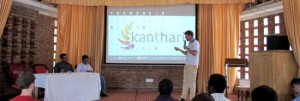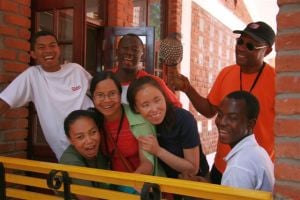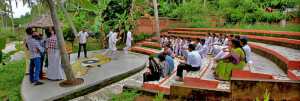By Bill Raeder and Jeanne Flannery
Kanthari is the name of a small pepper  native to southern India. It is hot and spicy, variable in its color and qualities as it ripens, and has nutritional and health benefits. Kanthari is also an institute for social change in the southern Indian state of Kerala. Its formal name is the International Institute for Social Entrepreneurs, but it is called Kanthari because it too is hot and spicy in its pursuit of the betterment of the human condition.
native to southern India. It is hot and spicy, variable in its color and qualities as it ripens, and has nutritional and health benefits. Kanthari is also an institute for social change in the southern Indian state of Kerala. Its formal name is the International Institute for Social Entrepreneurs, but it is called Kanthari because it too is hot and spicy in its pursuit of the betterment of the human condition.
Social visionaries from around the world come there as "Participants," each with their seedling of an idea for a grassroots project to reverse a social injustice inflicted upon some marginalized group. Staff and volunteers with relevant experience work as "Catalysts" to help Participants formulate their "big dreams" into concrete plans for well structured projects. Catalysts also provide them with tools for such functions as financial control, project management, and fundraising. Most of the Participants are from Africa and Asia and many of them have experienced in their own lives a "pinch point" where they have experienced and overcome adversity.
Catalysts also provide them with tools for such functions as financial control, project management, and fundraising. Most of the Participants are from Africa and Asia and many of them have experienced in their own lives a "pinch point" where they have experienced and overcome adversity.
Take Samuel, for example, from Uganda, who was kidnapped and pressed into service as a child soldier. He was commanded to kill a woman who was disabled. Knowing he would be going before the firing squad, he refused. Because the commander of the firing squad happened to know his father, Samuel managed to get away and escape. After his son became deaf from Malaria, he directly experienced discrimination against the disabled, and inspired by that disabled woman, he was moved to start an organization in service to disabled people in his country.
Yamin from Myanmar is blind. Her project is to enable other blind women in her country to become economically self-sufficient by teaching them how to bake and how to launch their own bakeries.
Odion from Nigeria suffered the death of her sister in childbirth and now plans to greatly reduce such needless deaths in her country by providing health and maternity education to child-bearing aged women.
Nagendra from rural Nepal saw as a youth the ineffectiveness of the monarchy in improving social conditions such as education, medical care, and basic infrastructure. As a young man he was jailed when fighting for what became the successful overthrow of the monarchy. Now, 20 years later, he sees that waste and corruption, mismanagement, and incompetence have prevented the Republic from doing much better. He is starting a volunteer organization in his village to work shoulder-to-shoulder with elected officials and town administrators to identify and plan improvement projects and to provide training in project management, resource allocation, and sustainable leadership. His dream is to thus make his village a model of progressive good management of public resources.
Others are addressing prejudices against certain subgroups of society like widows who are shunned by the community and even unjustly blamed for their husband's death; teenage girls who become pregnant and are expelled from school as bad examples and are shunned by the community, even by their families; individuals with albinism who dread going out because they are so denigrated, even raped because of the superstition that sex with an albino will cure AIDS.
These are some of the 19 Participants that Jeanne and I worked with in our five-week stay there. We were volunteer Catalysts helping the Participants develop and present their "Dream Speeches" to be given as their last assignment before graduation. The requirement of presenting their project in a succinct, well-structured, and well rehearsed speech was for many of them also an exercise in refining and clarifying their project plans. Also, none of them learned English as their first language so they invited assistance with vocabulary and rhetoric. The Participants were happy, committed, and spirited as was the whole campus, so for us, working with them was an enriching and joyful experience.
 The two founders, Sabriye Tenberken from Germany and Paul Kronenberg from Holland are themselves wonderful models of social enterprise. They previously founded Braille without Borders, a school for blind children in Tibet, and The Farm, also in Tibet, a vocational training and skills development Center for the blind with its environmentally and financially sustainable agriculture and economically sound production of ancillary products like cheese and bread. Less than a decade ago, having delegated the daily management of the school and the farm to their graduates, they set forth to multiply their effect by founding Kanthari to stimulate, train, and support others to develop like projects.
The two founders, Sabriye Tenberken from Germany and Paul Kronenberg from Holland are themselves wonderful models of social enterprise. They previously founded Braille without Borders, a school for blind children in Tibet, and The Farm, also in Tibet, a vocational training and skills development Center for the blind with its environmentally and financially sustainable agriculture and economically sound production of ancillary products like cheese and bread. Less than a decade ago, having delegated the daily management of the school and the farm to their graduates, they set forth to multiply their effect by founding Kanthari to stimulate, train, and support others to develop like projects.
They have taken a raw piece of jungle on a lake shore in the outskirts of the city of Trivandrum and created an attractive and  functional award-winning eco-friendly campus. In addition to an auditorium, various assembly rooms, a dormitory, an office building, and a kitchen from which three meals a day are served year-round, there is an outdoor amphitheater where 7:00am lectures are often conducted. Notably there are numerous places indoors and out where small groups of people may be spontaneously attracted to confer.
functional award-winning eco-friendly campus. In addition to an auditorium, various assembly rooms, a dormitory, an office building, and a kitchen from which three meals a day are served year-round, there is an outdoor amphitheater where 7:00am lectures are often conducted. Notably there are numerous places indoors and out where small groups of people may be spontaneously attracted to confer.
The class of 2014 graduated on December 19th with Participants acquiring their new appellation, Kantharis. They've gone home now to commence "Act V," setting up their projects while still under the active mentorship of Catalysts back on campus.
Applicants for the class of 2015 starting in May are now being recruited with an online application deadline of February 15th. Special attention is being given to attract blind applicants.
Successful applicants who become participants receive a full scholarship including room, board, and laundry facilities, but they must meet these requirements: pay for their own transportation and visa, provide their own pocket-money, be 22 years of age or older, have sufficient proficiency in English for the conduct of all activities, have basic computer proficiency, and the big one – they must have a big dream.
Learn more about graduate Kantharis and their projects.
For the story of how a blind woman from Germany ended up as the cofounder of a school for blind children in Tibet and as the creator of the braille code for the Tibetan language read the fascinating book, My Path Leads to Tibet by Sabriye Tenberken.
